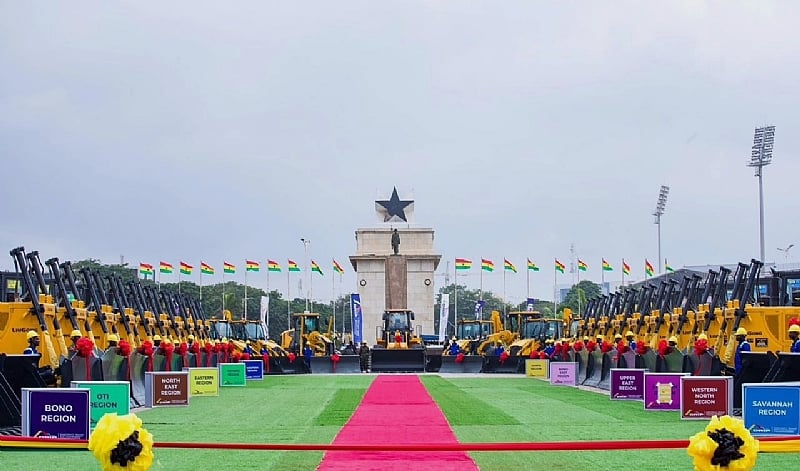The District Road Improvement Programme (DRIP), initiated in August 2024 under the previous administration of President Nana Addo Dankwa Akufo-Addo, aimed to revolutionize road infrastructure across Ghana. The program’s ambitious goals encompassed enhancing road maintenance and construction in every district, empowering Metropolitan, Municipal, and District Assemblies (MMDAs) with modern equipment, and providing advanced technical training to local authorities. While the project’s objectives were laudable, its financial execution has come under intense scrutiny, with allegations of significant inflation and irregularities in the contract award process. Mr. Samuel Okudzeto Ablakwa, the Minister-designate for Foreign Affairs, has called upon President John Dramani Mahama to thoroughly review and renegotiate the terms of the DRIP contract to address these concerns and protect public funds.
At the heart of the controversy is a suspected overpricing of the DRIP contract by over $100 million. Mr. Ablakwa, during his vetting by Parliament’s Appointments Committee, raised serious concerns about the alleged inflation, arguing that the contract’s current terms represent a significant drain on Ghana’s limited resources. He emphasized the importance of reclaiming these “inflated funds” to bolster other critical sectors such as education, healthcare, and social welfare programs. With only 25% of the project’s total cost disbursed and liabilities remaining open, Mr. Ablakwa believes a renegotiation presents a timely opportunity to rectify the alleged financial mismanagement and secure a more favorable agreement for Ghana. This renegotiation, he contends, is crucial, particularly given the country’s ongoing economic challenges and its reliance on an IMF bailout.
The controversy surrounding the DRIP contract deepens with allegations of an opaque procurement process. Mr. Ablakwa has revealed that the contract was not awarded through a competitive bidding process, but rather through a single-sourced deal with J.A. Plantpool, a subsidiary of the Zoomlion conglomerate. This lack of transparency raises further questions about the contract’s legitimacy and reinforces suspicions of potential wrongdoing. The minister-designate’s insistence on a renegotiation underscores the Mahama administration’s commitment to financial accountability and its determination to ensure value for money in public projects. Recovering the alleged inflated amount, according to Mr. Ablakwa, could significantly contribute towards alleviating Ghana’s economic difficulties and free up resources for much-needed investments in other vital sectors.
The significance of Mr. Ablakwa’s call for renegotiation is amplified by Ghana’s current economic predicament. The country is grappling with significant economic challenges, necessitating an IMF bailout program. Against this backdrop, maximizing the efficient use of public funds is paramount. The potential recovery of over $100 million through renegotiating the DRIP contract could provide a much-needed financial boost and contribute significantly to the country’s economic recovery efforts. Moreover, redirecting these funds towards education, healthcare, and social programs could have a transformative impact on the lives of ordinary Ghanaians, particularly in the context of the ongoing economic hardships.
The DRIP, with its focus on improving road infrastructure across all districts, holds great potential for enhancing connectivity, facilitating trade, and boosting economic activity in rural areas. However, the alleged financial irregularities and the lack of transparency in the contract award process undermine the project’s potential benefits and raise serious concerns about governance and accountability. Mr. Ablakwa’s call for renegotiation represents a crucial step towards addressing these issues and ensuring that the DRIP fulfills its intended purpose of fostering development and improving the lives of Ghanaians.
By revisiting the terms of the DRIP contract, the Mahama administration demonstrates its commitment to responsible fiscal management and its determination to protect public resources. The potential recovery of substantial funds through renegotiation could prove instrumental in addressing Ghana’s economic challenges and ensuring that public investments are utilized effectively for the benefit of all citizens. Furthermore, a transparent and accountable approach to public procurement will be essential to rebuilding public trust and ensuring that future infrastructure projects are conducted with integrity and efficiency.














